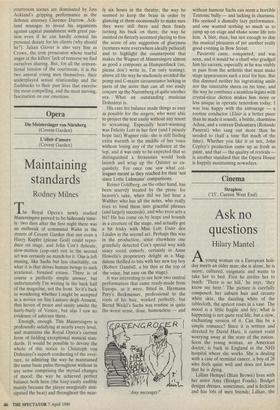Opera Die Meistersinger von Niintherg (Covent Garden)
L'elisir d'amore (Covent Garden)
Maintaining standards
Rodney Milnes
The Royal Opera's newly studied Mastersingers proved to be hideously time- ly: two days after the first night there was an outbreak of communal Wahn in the streets of Covent Garden that not even a Harry Kupfer (please God) could repro- duce on stage, and John Cox's delicate, slow-motion (cop-out) not in the second act was certainly no match for it. One is left musing, like Sachs but less charitably, on what it is that drives human beings to such irrational, frenzied excess. There is of course a perfectly simple answer, but unfortunately I'm writing in the back half of the magazine, not the front. So it's back to wondering whether I might be accepted as a novice on San Lazzaro degli Armeni, that haven of peace and sanity amidst the hurly-burly of Venice, but alas I saw no evidence of ashtrays there.
Enough, enough. This Mastersingers is profoundly satisfying at nearly every level, and maintains the Royal Opera's current form of fielding exceptional musical stan- dards. It would be possible to devote the whole of this notice to Christoph von Dohnanyi's superb conducting of the over- ture, to admiring the way he maintained the same basic pulse throughout without in any sense comprising the myriad changes of mood; the way he achieved perfect balance both here (the harp easily audible mainly because the player marginally anti- cipated the beat) and throughout the near- ly six hours in the theatre; the way he seemed to keep the brass in order by glancing at them occasionally to make sure they were still there and then firmly turning his back on them; the way he insisted on fiercely accented playing to free the score of any suggestion of glueyness (textures were everywhere ideally pellucid) and to highlight the counterpoint that makes the Wagner of Mastersingers almost as good a composer as Humperdinck (no, please don't write in, I'm only teasing); above all the way he studiously avoided the pomp and C-major circumstance lurking in parts of the score that can all too easily conjure up the Nuremberg of quite another era. What an outstanding musician Dohnanyi is.
His care for balance made things as easy as possible for the singers, who were able to project the text easily without any resort to screaming. Especially heart-warming was Felicity Lott in her first (and I piously hope last) Wagner role: she is still finding extra warmth in the middle of her voice without losing any of the radiance at the top, and it was only to be expected that so distinguished a Straussian would both launch and wrap up the Quintet so ex- quisitely. For once one saw what col- leagues meant as they reached for their 'not since Lotte Lehmann' comparisons.
Reiner Goldberg, on the other hand, has been scurvily treated by the press: for heaven's sake, when did we last hear a Walther who has all the notes, who really tries to bind them into graceful phrases (and largely succeeds), and who even acts a bit? He has come on by leaps and bounds as a creature of the stage, and actually got a bit frisky with Miss Lott Unter den Linden in the second act. Perhaps this was in the production, since elsewhere one gratefully detected Cox's special way with saucy social comedy, certainly in Anne Howells's proprietory delight as a Mag- dalene thrilled to bits with her new toy boy (Robert Gambill, a bit thin at the top of the voice, but easy on the stage).
It was interesting to see how two central performances that came ready-made from Europe, as it were, fitted in. Hermann Prey's Beckmesser, professional to the roots of his hair, worked perfectly, but Bernd Weikl's Sachs was routine in quite the worst sense, dour, humourless — and ' Any messages?' without humour Sachs can seem a horrible Teutonic bully — and lacking in charisma. His seemed a dismally lazy performance, and one wanted nothing so much as to jump up on stage and shake some life into him. A blot, then, but not enough to dim the musical pleasures of yet another really good evening in Bow Street.
Pavarotti came, conquered, and was seen, and it would be a churl who grudged him his success, especially as he was visibly in pain from the arthritis that must make stage appearances such a trial for him. But this dimmed neither his ingratiating smile nor the inimitable sheen on his tone, and the way he combines a seamless legato with crystal-clear diction makes him more or less unique in operatic tenordom today. I was less happy with the entourage — a routine conductor (Elisir is a better piece than he made it sound), a brittle, charmless Adina, and a veteran Dulcamara (Rolando Panerai) who sang out more than he needed to (half a tone flat much of the time). Whether you like it or not, John Copley's production came up as fresh as paint, and that — the quality of revivals is another standard that the Opera House is happily maintaining nowadays.


























































 Previous page
Previous page